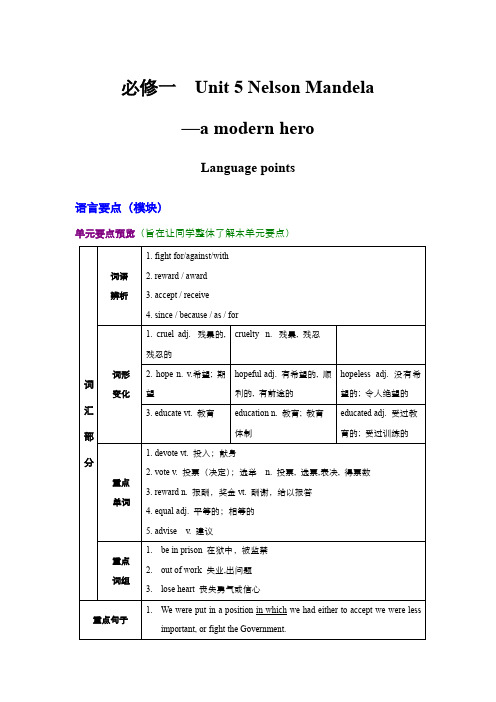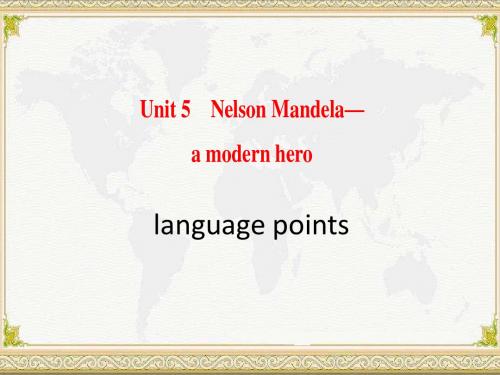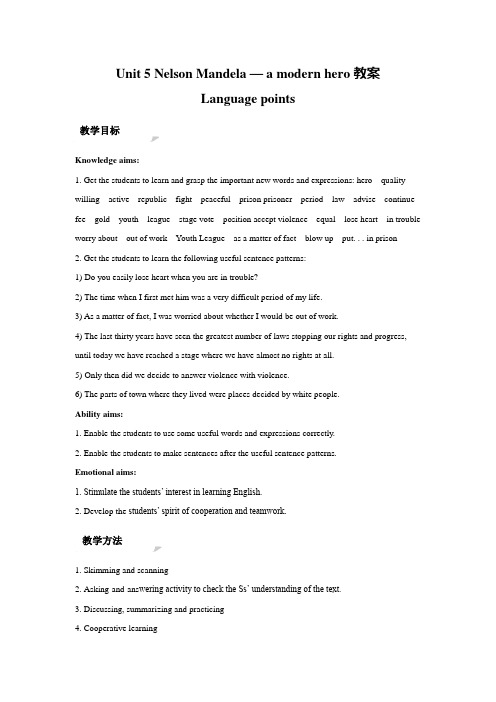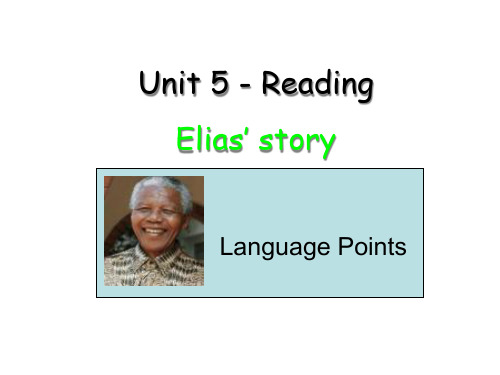人教版 必修一 Unit 5 Nelson Mandela language points
- 格式:ppt
- 大小:2.18 MB
- 文档页数:29

必修一Unit 5 Nelson Mandela—a modern heroLanguage points语言要点(模块)单元要点预览(旨在让同学整体了解本单元要点)Ⅰ词语辨析(旨在提供完形填空所需材料)与后面的分句对前一句话起到补充说明的作用II词性变化(旨在提供语法填空所需材料)Parents should _________ their children to behave well. (educate)s tudentsⅢ重点词汇(旨在提供综合运用所需材料)1. devote vt.投入;献身[典例]1). He devoted himself entirely to music. 他将一生奉献给了音乐。
2). Mary devoted her life to caring for the sick. 玛丽献身于为病人服务。
[重点用法]devote… to… 献身于;专心于在devote… to…短语中,to是介词,后面接名词或动词-ing。
常见的类似短语还有:pay attention to(注意……); stick to(坚持……); lead to(导致……); prefer…to(相比……更喜欢……); look forward to(盼望……);[练习] 中译英1). 她深爱她的孩子。
2). 我们应全力以赴地工作。
Keys: 1). She is devoted to her children.2). We should devote all our efforts to our tasks.2. vote v. 投票(决定);选举n. 投票, 选票,表决, 得票数[典例]1). We voted Democrat in the last election. 我们在上次的选举中投了民主党的票。
2). We’ll listen to the arguments on both sides and then vote on it.我们会先听取双方的论证后再作表决。
![新人教必修一 Unit 5 Nelson Mandela-Language points[课件]](https://img.taocdn.com/s1/m/1f6c23174431b90d6c85c778.png)


Unit 5 Nelson Mandelaa modern heroContents 目录一、单元教学目标和要求(Teaching aims and demands)二、教材内容分析 (Analysis of the teaching materials三、教学安NF (Teaching arrangements)四、单元预习任务(Pre-unit Activities: Preview Task)五、教学步骤(Teaching procedures)六、背景参考资料(Background knowledge)七、评价与反思(Assessment and reflection)、教学目标和要求(Teaching aims and demands)根据课程标准实验教材(英语必修)关于总目标的具体描述,结合高一学生实际和教材内容,我们将教学目标分为语言知识、语言技能、学习策略、情感态度和价值观四个方面。
1.语言知识(Knowledge)词汇(Vocabulary ):能理解、内化、运用以下生词---- hero, quality, willing, active, republic, fight, peaceful, prison, prisoner, period, law, advise, continue, fee, gold league , stage , vote , position , accept , violence , equal , blanket , degree, guard , educated , terror , fear , cruelty , reward , right (n. ), criminal , leader , president , sentence (v. ), sincerely短语(Phrases and expressions) : lose heart, in trouble ,worry about, out of work, Youth League, as a matter of fact, blow up, put ... in prison, come to power , setup , be sentenced to功能(Functions):学习掌握一些用于发表意见与评论的结构句式,如:1. 发表意见(Giving opinions )Why do you think so? What do you think of …? What's you opinion?agree / don't agree. I think / don't think .... I prefer .... In myopinion ....I'm afraid ....2.评论(Making comments)Good idea! That's an excellent idea .语法(Grammar):定语从句(II )(由where, when, why, 介词+ which, 介词+ whom引导的定语从句)The school where I studied only two years was three kilometres awayThis was a time when you had got to have a passbook to live in JohannesburgThe reason why I got a job was because of my hard work .•••we were put in a position in which we had either to accept we were less important, or fight the Government .The person to whomyou should be grateful for a peaceful South Africa is Nelson Mandela.扩展词汇:negative(消极的),heroine(女主角,女主人公),unwilling(不情愿的),nation(国家,民族),sacrifice(牺牲),realize (认识到),give up (放弃),riches (财富),Bible (圣经),revolution (革命),career (职业),equality (平等),fairness(公平),conflict (冲突),biography (自传),beliefs (信仰),Christianity (基督教),religion (宗教),priests (牧师),version (翻译),readable (易读的),adventure (冒险),scholar (学者),sympathy (同情),,campaign (从事活动),communist (共产主义者),injustice (不公平),oppose (反对),pilot(飞行员) , boycott (联合抵制)2.语言技能(Skills)听:在本单元的课文及练习册听力教学中,能听懂人物和事件以及它们的关系,能抓住所听语段中的关键词,正确理解话语间的逻辑关系。

Unit 5 Nelson Mandela — a modern hero教案Language pointsKnowledge aims:1. Get the students to learn and grasp the important new words and expressions: heroqualitywilling active republic fight peaceful prison prisoner period law advise continue fee gold youth league stage vote position accept violence equal lose heart in trouble worry about out of work Youth League as a matter of fact blow up put. . . in prison2. Get the students to learn the following useful sentence patterns:1) Do you easily lose heart when you are in trouble?2) The time when I first met him was a very difficult period of my life.3) As a matter of fact, I was worried about whether I would be out of work.4) The last thirty years have seen the greatest number of laws stopping our rights and progress, until today we have reached a stage where we have almost no rights at all.5) Only then did we decide to answer violence with violence.6) The parts of town where they lived were places decided by white people.Ability aims:1. Enable the students to use some useful words and expressions correctly.2. Enable the students to make sentences after the useful sentence patterns.Emotional aims:1. Stimulate the students’ interest in learning English.2. Develop the st udents’ spirit of cooperation and teamwork.1. Skimming and scanning2. Asking-and-ans wering activity to check the Ss’ understanding of the text.3. Discussing, summarizing and practicing4. Cooperative learningImportant teaching points1. Enable the students to grasp the usages of such important new words and expressions as fight, advise, accept, continue, active, lose heart, in trouble, in prison, as a matter of fact, etc.2. Get the students to master the patterns:“. . . only then did we decide to answer violence with violence. ” and “. . . we were put in a position in which we had either to accept we were less important, or fight the Government. ”Difficult teaching points1. Let the students le arn the usage of the word “advise”.2. Enabl e the students to master the usage of the pattern “. . . only then did we decide to answer violence with violence. ” and understand some difficult and long sentences.Step 1 Language points1. The time when I first met Nelson Mandela was a very difficult period of my life. 第一次见到纳尔逊·曼德拉的时候,是我一生中非常艰难的时期。

Unit 5 Nelson Mandela - a modern hero教案Using languageIntroductionLanguage is learned to be used in and for communication. So in this period we shall have the students not only listen but also read and write in English. The most attention goes to reading and writing.Objectives■To help the students listen about the same topic as is read in the first period■To help students read another passage about the same person covered in the first period■To help students write an imaginary letter making use of the learned words and structures Procedures1. Warming up by listeningWe have read a story about Elias. Do you remember why it was difficult for him to get a job? Yes, you are right. He didn’t have a passbook. But what is a passbook? Why is it important?Let’s listen t o a short passage and find out. Now turn to page 38. Listen to the tape for the text. 2. Reading and copyingOn page 38 you see a passage entitle THE REST OF ELIAS’ STORY. Go over it to find the sentences you can’t understand. And copy down all the usefu l expressions at the same time.Useful expressionsmake…afraid, escape from…, spend the hardest time, help…in one way, begin a school for…, study very little, during the lunch break, under one’s blanket, make candles, study for one’s degree, allow…to join…,stop…from…, pass the exam, get a degree, feel good about…, finish four years in prison, find a job, work in…, blow up…, lose one’s job, come to power, beg for…, take …round…, feel bad, work for…, show…over…, make …free in one’s own land3. Acting a text dialogueNext we are going to do a group activity. We will do it in groups of four. Suppose one of you is Elias and works as a tour guide. The other three of you are tourists who are very interested in the prison and Mandela’s life.Tourist: How did you get to know Nelson Mandela?Elias: It was in 1950. I was working as a miner in Johannesburg but I hadn’t a passbook to live there. So I went to Mandela’s law firm to ask for advice.Tourist: Can you explain to me some of Nelson Mandela’s political ideas or beliefs?Elias: Yes. He found that we black people were not treated as equally as the white people and he would fight for our rights. However, he said that we should fight in a peaceful way. Only when this was not allowed did we decide to answer violence with violence.Tourist: How did he help you through your life?Elias: First, he helped me to get the correct papers to stay in Johannesburg and keep my job as I mentioned above. Then he taught me to read and write when I was in prison. This is very important to me because it enables me to get more job opportunities. Later he gave me my present job.Tourist: What was life like on Robben Island?Elias: Miserable and cruel. The guards and soldiers treated us badly, beat us violently for no reasons and insulted us in different ways.Tourist: How did you manage to study on Robben Island?Elias: We studied during the lunch breaks and the evenings when we should have asleep. We read books under our blankets and used anything we could find to make candles to see the words.Tourist: What kinds of job have you ever done?Elias: A miner, an office worker and now a tour guide.Tourist: What do you think of your present job?Elias: I like it very much. And I am proud to show visitors over the prison, for I helped to make our people free in our own land.4. Doing a guided writing task⑴Preparing for writingImagine now Mr Mandela is in prison. If you are going to write a letter to the President of South Africa asking him to free Nelson Mandela, what would be included? Do you remember the format of a letter? What should be the main content of this letter? How would you try to persuade the president?Now go over Life of Nelson Mandela on page 39 for any useful information.⑵Writing the letterDoctor 26, 2007The Honorable President of South AfricaDear Mr. President:We are writing you bec ause we think South Africa’s policy toward Mr Mandela is not right, and that we may soon face a threat in our country more serious than any we have known since the end of last century.Mr Mandela is a great person. He works for the equal rights of the black people. The blacks are human beings. They have the same right as the whites’ to live in this land. In your upcoming New Year’s Speech, you h ave an opportunity to plan a clear and determined course for meeting this threat. We ask you to seize that opportunity, and to work out a new policy that would protect the interests of the people. That policy should aim, above all, at the freedom of Mr Mandela. We stand ready to offer our full support in this difficult but necessary effort.We ask you to ac t decisively. If you act now to end Mandela’s imprisonment, you will be acting in the most fundamental national interests of the country. If you keep him still in prison, you put our interests and our future at risk.Sincerely,Elliott Abrams, Richard L. Armitage, William J. Bennett 5. Closing down by sharingTo end this period share your letter with your partners and make necessary changes.。